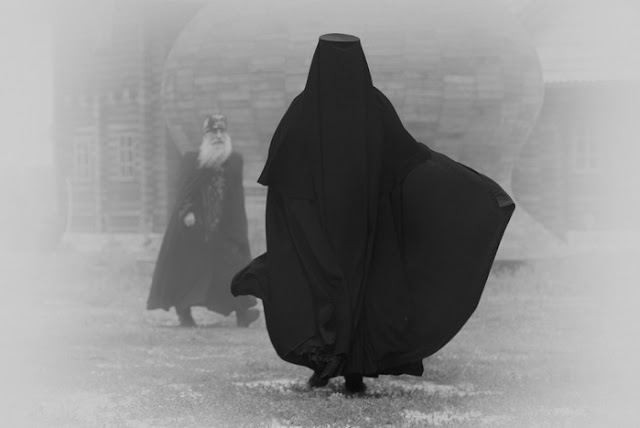January 3, 1879 …
In our
last letter of December 14, you wrote that you cannot find any books applicable
to your situation. You say that all books discuss monasticism, and that you are
not a nun but are simply living near a monastery. In response I would say this
to you: the Gospel teaching is given to everyone in common, and everyone is
obliged to fulfill it. Monasticism stemmed from the desire to live exactly
according to the Gospel teaching. This is terribly difficult amidst the noise
of the city and the cares of life in the world, which hinder such a precise
fulfillment of the Gospel teaching, even though everyone is called to this.
Monastics are distinguished from laymen in that the latter are permitted to
live in a state of matrimony, while the former choose to remain unmarried. Read
more often the Gospel of Matthew, from the beginning of the fifth chapter to
the end of the tenth, and try to live according to what is written there. Then
your life will be marked by harmony, and you will find peace of soul.
January 11, 1879
Peace to
you and God’s blessing, and a strengthening towards good. On January 3 I
briefly wrote to you that monastic life by no means differs from the Gospel
teaching, and that those living in the world differ from monastic s only as
concerns their married state. About married people, however, St. John of the
Ladder writes that they are like those whose hands and feet are bound with
fetters. Although even these can walk the path of righteousness, it is only
with difficulty; they often stumble and fall and become sorely wounded as a
result. The unmarried–and particularly monastic–state offers greater facility
in the fulfillment of the Gospel teaching. It is for this reason that
monasticism was established by the Holy Fathers.
You are
now in the middle, between the world and monasticism. The middle path is
everywhere approved, and for you–both on account of your upbringing and your weak
constitution–it is in many ways appropriate. Only try to live according to the
Gospel commandments. Above all, judge no one about anything, so that you
yourself will not be judged...
In my
letters I’ve always had one aim –to dispel your misconceptions about
monasticism and spiritual life in general, which you formed while still living
in the world. You have perhaps heard it said that even apparently correct
theory does not always coincide with practice. One’s own experience, when it
follows the experience of spiritual people in the past, is a good instructor,
provided we check our life against the Biblical and patristic teaching.
You laid
for yourself and your life a rather strange foundation: I wanted so, I thought
so, I intended so… You are not the only one; many desire a good spiritual life
in the simplest form. Few, however, (they are rare, in fact) fulfill their good
desires in actuality; they are those who hold tightly the words of Holy
Scripture: “We must through much tribulation enter into the kingdom of God”
(Acts 14:22), and who, entreating the help of God, try to bear the griefs and
illnesses and various discomforts visited upon them without murmuring, always
keeping in remembrance the words of the Lord Himself: If thou wilt enter into
life, keep the commandments. (Matt. 19:17)
And the
most important of these commandments are: “Judge not and ye shall not be
judged; condemn not, and ye shall not be condemned: forgive, and ye shall be
forgiven” (Luke 6:17). Besides this, those who want to be saved must bear in
mind the words of St. Peter Damascene, that salvation is accomplished between
fear and hope…
To live
in a simple hut without humbling oneself will not lead to any good. It is
better for someone who is weak in soul and body to live in a comfortable cell
and to humble himself, blaming and reproaching himself for such comfortable and
spacious quarters. Only few, and those possessing a strong constitution, can
without harm lead an austere life, and endure cold and hunger and dampness and
sleeping on the ground. According to the words of St. John Damascene, those who
are weak in body derive more profit from humility and thanksgiving than from
physical labors and podvigs to which they are unequal.
You are
adversely affected by the harsh words of such people who, in your opinion,
should speak differently. St. John Climacus writes that God providentially
leaves some flaws even in spiritual people so as to bring them to humility.
If you
wish to set yourself on a firm path toward salvation, try above all to pay heed
to yourself alone, and leave everyone else to God’s Providence and their own
will, and don’t concern yourself with instructing anyone. Not in vain is it
said: Each man begetteth himself shame or glory according to his deeds. This
will be most beneficial, meat conducive to salvation, and, what’s more, more
peaceful.
Source: http://www.pravmir.com/monasticism-and-life-in-the-world/
















CONVERSATION